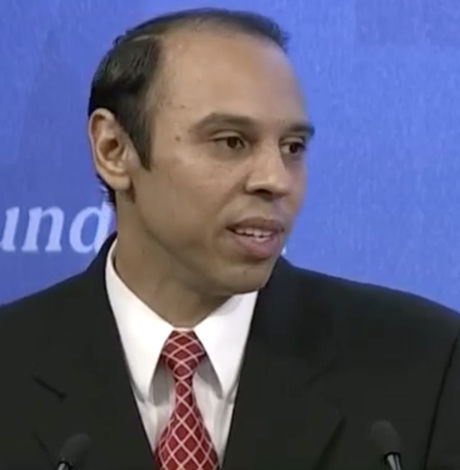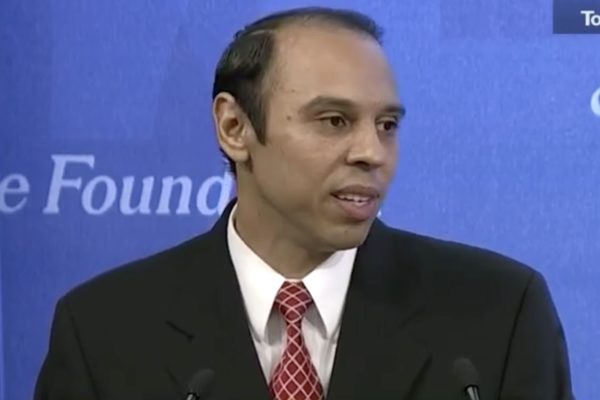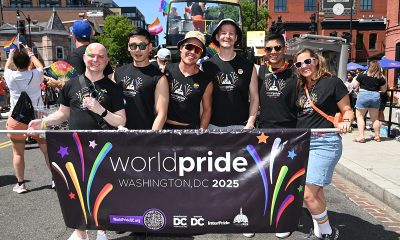National
Trump’s HHS appoints anti-trans activist to protect trans health
Severino a former staffer with the anti-LGBT Heritage Foundation


Roger Severino, director of the DeVos Center for Religion and Civil Society, Institute for Family, Community, and Opportunity at the Heritage Foundation. (Image courtesy C-Span)
A series of statements from LGBT advocates came out Thursday over the appointment of Roger Severino, who until this week was director of the DeVos Center for Religion & Civil Society for the Heritage Foundation.
Winnie Stachelberg, executive vice president for external affairs at the Center for American Progress, gave no quarter in a statement over the Severino’s appointment and its implications for transgender health.
“Frankly, it is sick that President Trump would appoint Roger Severino to lead OCR – putting a man who made his career opposing healthcare non-discrimination laws in charge of enforcing those very same protections,” Stachelberg said. “Before the Affordable Care Act, insurance companies routinely denied equal treatment to same-sex couples and more than half of private insurance plans explicitly discriminated against transgender patients, with more than a quarter of transgender people reported being denied medical care by a provider. Severino’s writing makes it clear that he wants to take us back to the days when 1 in 4 transgender people was refused medical care outright.”
Among the posts Severino wrote for The Daily Signal, the blog for the Heritage Foundation, were in opposition to LGBT people, especially transgender rights. After the White House came out against a provision in a congressional defense spending package that would have allowed anti-LGBT discrimination among federal contractors, Severino wrote a post called “Obama Threatens to Veto Military Bill Because It Protects Religious Groups.” After the Pentagon lifted its ban on openly transgender service, Severino wrote a post called “Pentagon’s Transgender Policy Defies Common Sense.”
Severino also defended North Carolina’s anti-LGBT House Bill 2, which prohibits transgender people from using the restroom in schools and government buildings consistent with their gender identity. Decrying the “unrelenting and coordinated attacks” against the state for enacting the law, Severino criticized former U.S. Attorney General Loretta Lynch for filing a federal lawsuit against the measure, which he said amounted to progressives “using government power to coerce everyone, including children, into pledging allegiance to a radical new gender ideology.”
Marguerite Bowling, a spokesperson for the Heritage Foundation, defended Severino in response to concerns he’d seek to undermine transgender health in his role at HHS.
“Roger Severino has a distinguished record of fighting for the civil rights and freedoms of all Americans,” Severino said. “We have no doubt that Roger in his new role at HHS will protect the civil rights of all Americans.”
As head of the HHS civil rights division, Severino would be charged with enforcing Section 1557 of Obamacare, which prohibits discrimination on the basis of race, sex, disability and age in health programs. The Obama administration interpreted the prohibiting on sex discrimination to bar discrimination against transgender people in health care, including the refusal of gender reassignment surgery.
Wade Henderson, outgoing CEO of the Leadership Conference on Civil & Human Rights, said in a statement the office of civil rights at HHS requires “strong and experienced leadership” to enforce Section 1557, and Severino is “not that leader.”
“Since enactment of the ACA seven years ago today, members of The Leadership Conference have strongly advocated for the full and complete implementation of Section 1557,” Henderson said. “In his previous position at the Heritage Foundation, Mr. Severino repeatedly denounced and actively worked to oppose OCR’s implementation of Section 1557. These actions call into question his ability to fully enforce the ACA and protect communities of color and other underserved populations, who are most at risk for unequal access to health and health care.”
It should be noted U.S. District Judge Reed O’Connor has enjoined the enforcement of the Obamacare regulation interpreting Section 1557 to apply to transgender people. The Trump administration missed a deadline to appeal the decision to the U.S. Fifth Circuit Court of Appeals, but the American Civil Liberties Union is seeking to intervene to defend the regulation.
Harper Jean Tobin, policy director for the National Center for Transgender Equality, said Severino could still do “a number of things” to impact transgender protections under Section 1557 as litigation proceeds.
“The government will now have to make a decision, and OCR is ostensibly the client DOJ in this decision, as to whether to ensure, as the government normally would in a case like this, that federal law and the federal regulation interpreting it and applying the federal law is defended, that a rule overturning it is reviewed by a higher court,” Tobin said. “I think the fear is that OCR and DOJ could sort of work together to have this injunction made permanent without any review by a higher court, which would be highly unusual and really inappropriate.”
After a rule-making process consisting of many years and with two separate comment periods, Tobin said letting the injunction against the regulation stand would be “tantamount to repealing the regulation without going the required rule-making process and instead just acceding to a fringe legal position by one district court judge.”
Tobin added OCR has other responsibilities related to transgender health, such as the federal health care privacy law, or HIPAA, which assures privacy for transgender people in health care settings.
“Up until now, OCR has in cases involving transgender people, just as it does for everybody else, acted to enforce the laws to protect their privacy, but given Mr. Severino’s aggressively hostile work to dismantle any kind of legal protections for transgender people, we’re worried about what kind of direction the agencies would take on those bedrock protections,” Tobin said.
Caitlyn Oakley, an HHS spokesperson, had no comment in response to concerns from LGBT advocacy groups that Severino wouldn’t protect transgender health in his new role.
“We aren’t commenting on personnel at this time,” Oakley said.
Matt McTighe, executive director of Freedom for All Americans, said in a statement Severino appointment to HHS and his anti-trans history spells trouble for transgender health.
“Roger Severino has a proven track record of opposing fair and equal treatment for the transgender community,” McTighe said. “He is a dangerous pick for a position that is meant to enforce critical civil rights protections. This is yet another example of the Trump administration’s failure to live up to the president’s campaign promise of protecting LGBT people and it will have devastating consequences for transgender people across the country.”

The Comings & Goings column is about sharing the professional successes of our community. We want to recognize those landing new jobs, new clients for their business, joining boards of organizations and other achievements. Please share your successes with us at [email protected].
Congratulations to Gil Pontes III on his recent appointment to the Financial Advisory Board for the City of Wilton Manors, Fla. Upon being appointed he said, “I’m honored to join the Financial Advisory Board for the City of Wilton Manors at such an important moment for our community. In my role as Executive Director of the NextGen Chamber of Commerce, I spend much of my time focused on economic growth, fiscal sustainability, and the long-term competitiveness of emerging business leaders. I look forward to bringing that perspective to Wilton Manors — helping ensure responsible stewardship of public resources while supporting a vibrant, inclusive local economy.”
Pontes is a nonprofit executive with years of development, operations, budget, management, and strategic planning experience in 501(c)(3), 501(c)(4), and political organizations. Pontes is currently executive director of NextGen, Chamber of Commerce. NextGen Chamber’s mission is to “empower emerging business leaders by generating insights, encouraging engagement, and nurturing leadership development to shape the future economy.” Prior to that he served as managing director of The Nora Project, and director of development also at The Nora Project. He has held a number of other positions including Major Gifts Officer, Thundermist Health Center, and has worked in both real estate and banking including as Business Solutions Adviser, Ironwood Financial. For three years he was a Selectman, Town of Berkley, Mass. In that role, he managed HR and general governance for town government. There were 200+ staff and 6,500 constituents. He balanced a $20,000,000 budget annually, established an Economic Development Committee, and hired the first town administrator.
Pontes earned his bachelor’s degree in political science from the University of Massachusetts, Dartmouth.
Kansas
ACLU sues Kansas over law invalidating trans residents’ IDs
A new Kansas bill requires transgender residents to have their driver’s licenses reflect their sex assigned at birth, invalidating current licenses.

Transgender people across Kansas received letters in the mail on Wednesday demanding the immediate surrender of their driver’s licenses following passage of one of the harshest transgender bathroom bans in the nation. Now the American Civil Liberties Union is filing a lawsuit to block the ban and protect transgender residents from what advocates describe as “sweeping” and “punitive” consequences.
Independent journalist Erin Reed broke the story Wednesday after lawmakers approved House Substitute for Senate Bill 244. In her reporting, Reed included a photo of the letter sent to transgender Kansans, requiring them to obtain a driver’s license that reflects their sex assigned at birth rather than the gender with which they identify.
According to the reporting, transgender Kansans must surrender their driver’s licenses and that their current credentials — regardless of expiration date — will be considered invalid upon the law’s publication. The move effectively nullifies previously issued identification documents, creating immediate uncertainty for those impacted.
House Substitute for Senate Bill 244 also stipulates that any transgender person caught driving without a valid license could face a class B misdemeanor, punishable by up to six months in jail and a $1,000 fine. That potential penalty adds a criminal dimension to what began as an administrative action. It also compounds the legal risks for transgender Kansans, as the state already requires county jails to house inmates according to sex assigned at birth — a policy that advocates say can place transgender detainees at heightened risk.
Beyond identification issues, SB 244 not only bans transgender people from using restrooms that match their gender identity in government buildings — including libraries, courthouses, state parks, hospitals, and interstate rest stops — with the possibility for criminal penalties, but also allows for what critics have described as a “bathroom bounty hunter” provision. The measure permits anyone who encounters a transgender person in a restroom — including potentially in private businesses — to sue them for large sums of money, dramatically expanding the scope of enforcement beyond government authorities.
The lawsuit challenging SB 244 was filed today in the District Court of Douglas County on behalf of anonymous plaintiffs Daniel Doe and Matthew Moe by the American Civil Liberties Union, the ACLU of Kansas, and Ballard Spahr LLP. The complaint argues that SB 244 violates the Kansas Constitution’s protections for personal autonomy, privacy, equality under the law, due process, and freedom of speech.
Additionally, the American Civil Liberties Union filed a temporary restraining order on behalf of the anonymous plaintiffs, arguing that the order — followed by a temporary injunction — is necessary to prevent the “irreparable harm” that would result from SB 244.
State Rep. Abi Boatman, a Wichita Democrat and the only transgender member of the Kansas Legislature, told the Kansas City Star on Wednesday that “persecution is the point.”
“This legislation is a direct attack on the dignity and humanity of transgender Kansans,” said Monica Bennett, legal director of the ACLU of Kansas. “It undermines our state’s strong constitutional protections against government overreach and persecution.”
“SB 244 is a cruel and craven threat to public safety all in the name of fostering fear, division, and paranoia,” said Harper Seldin, senior staff attorney for the ACLU’s LGBTQ & HIV Rights Project. “The invalidation of state-issued IDs threatens to out transgender people against their will every time they apply for a job, rent an apartment, or interact with police. Taken as a whole, SB 244 is a transparent attempt to deny transgender people autonomy over their own identities and push them out of public life altogether.”
“SB 244 presents a state-sanctioned attack on transgender people aimed at silencing, dehumanizing, and alienating Kansans whose gender identity does not conform to the state legislature’s preferences,” said Heather St. Clair, a Ballard Spahr litigator working on the case. “Ballard Spahr is committed to standing with the ACLU and the plaintiffs in fighting on behalf of transgender Kansans for a remedy against the injustices presented by SB 244, and is dedicated to protecting the constitutional rights jeopardized by this new law.”
National
After layoffs at Advocate, parent company acquires ‘Them’ from Conde Nast
Top editorial staff let go last week

Former staff members at the Advocate and Out magazines revealed that parent company Equalpride laid off a number of employees late last week.
Those let go included Advocate editor-in-chief Alex Cooper, Pride.com editor-in-chief Rachel Shatto, brand partnerships manager Erin Manley, community editor Marie-Adélina de la Ferriére, and Out magazine staff writers Moises Mendez and Bernardo Sim, according to a report in Hollywood Reporter.
Cooper, who joined the company in 2021, posted to social media that, “Few people have had the privilege of leading this legendary LGBTQ+ news outlet, and I’m deeply honored to have been one of them. To my team: thank you for the last four years. You’ve been the best. For those also affected today, please let me know how I can support you.”
The Advocate’s PR firm when reached by the Blade said it no longer represents the company. Emails to the Advocate went unanswered.
Equalpride on Friday announced it acquired “Them,” a digital LGBTQ outlet founded in 2017 by Conde Nast.
“Equalpride exists to elevate, celebrate and protect LGBTQ+ storytelling at scale,” Equalpride CEO Mark Berryhill said according to Hollywood Reporter. “By combining the strengths of our brands with this respected digital platform, we’re creating a unified ecosystem that delivers even more impact for our audiences, advertisers, and community partners.”
It’s not clear if “Them” staff would take over editorial responsibilities for the Advocate and Out.




















